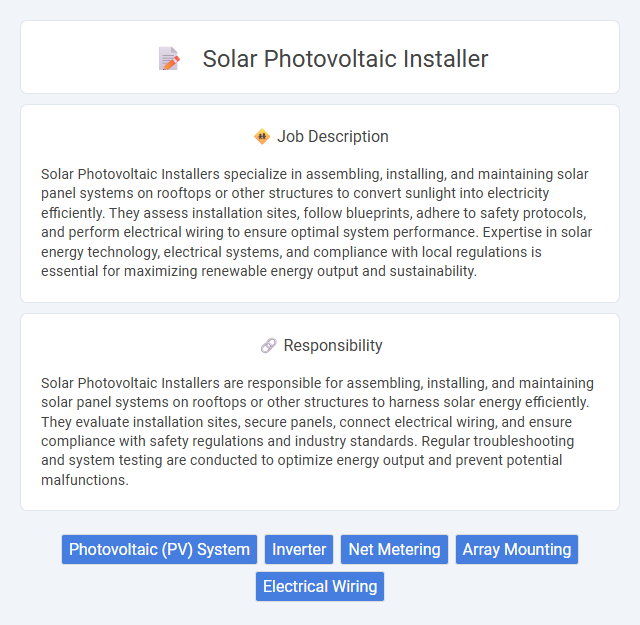
Solar Photovoltaic Installers specialize in assembling, installing, and maintaining solar panel systems on rooftops or other structures to convert sunlight into electricity efficiently. They assess installation sites, follow blueprints, adhere to safety protocols, and perform electrical wiring to ensure optimal system performance. Expertise in solar energy technology, electrical systems, and compliance with local regulations is essential for maximizing renewable energy output and sustainability.
Individuals with a strong interest in renewable energy and hands-on technical skills are likely to find a role as a solar photovoltaic installer suitable. Those comfortable with physical labor, working outdoors in various weather conditions, and climbing ladders or roofs may have a higher probability of thriving in this position. People with good problem-solving abilities and attention to detail might also adapt well to the precise installation and troubleshooting tasks involved.
Qualification
Solar photovoltaic installers typically require a high school diploma or equivalent, with many employers preferring candidates who have completed technical training or certification programs in solar energy or electrical systems. Knowledge of electrical systems, safety protocols, and the ability to read blueprints and technical diagrams are essential qualifications. Hands-on experience through apprenticeships or internships significantly enhances job prospects in this growing renewable energy field.
Responsibility
Solar Photovoltaic Installers are responsible for assembling, installing, and maintaining solar panel systems on rooftops or other structures to harness solar energy efficiently. They evaluate installation sites, secure panels, connect electrical wiring, and ensure compliance with safety regulations and industry standards. Regular troubleshooting and system testing are conducted to optimize energy output and prevent potential malfunctions.
Benefit
Solar photovoltaic installers likely enjoy benefits such as competitive wages and the potential for steady employment due to the growing demand for renewable energy solutions. Health insurance and retirement plans may be offered by many employers to support long-term employee well-being. Opportunities for career advancement and skill development could also increase job satisfaction and financial stability in this role.
Challenge
The role of a Solar Photovoltaic Installer likely involves the challenge of accurately assembling and installing solar panel systems under varying environmental conditions. Managing the technical complexity of electrical components and ensuring compliance with safety standards could require continual learning and adaptation. Overcoming these obstacles might demand problem-solving skills and a strong commitment to quality workmanship.
Career Advancement
Solar Photovoltaic Installer roles offer promising career advancement through gaining expertise in system design, installation, and maintenance of solar energy systems. Advancing professionals often pursue certifications such as NABCEP to qualify for higher-level positions like project manager or solar energy consultant. Growing demand for renewable energy technologies further accelerates opportunities for leadership and specialized technical roles within the solar industry.
Key Terms
Photovoltaic (PV) System
Solar Photovoltaic (PV) Installers specialize in assembling, installing, and maintaining solar panel systems that convert sunlight into electricity. They ensure the proper positioning, wiring, and secure mounting of PV modules to maximize energy efficiency and comply with electrical codes. Expertise in interpreting technical blueprints and troubleshooting electrical or mechanical issues is essential for optimizing the performance and longevity of PV systems.
Inverter
Solar photovoltaic installers specialize in the installation and maintenance of solar energy systems, with a critical focus on inverters that convert direct current (DC) generated by solar panels into alternating current (AC) for usable electricity. Expertise in selecting, configuring, and troubleshooting string inverters, microinverters, or power optimizers is essential to maximize system efficiency and reliability. Knowledge of grid-tied inverter regulations and monitoring software ensures compliance and optimal energy output in residential and commercial solar installations.
Net Metering
Solar photovoltaic installers play a crucial role in the deployment of renewable energy systems by assembling, installing, and maintaining solar panel arrays that convert sunlight into electricity. Their expertise directly impacts the effectiveness of net metering policies, which allow homeowners and businesses to feed excess solar energy back into the grid, earning credits or reducing electricity bills. Knowledge of electrical systems, local regulations, and photovoltaic technology is essential to optimize energy production and maximize benefits under net metering programs.
Array Mounting
Solar photovoltaic installers specialize in array mounting, ensuring solar panels are securely and accurately fixed to rooftops or ground structures to maximize energy capture and system durability. Precision in aligning and fastening racking systems directly influences the efficiency of solar arrays and overall photovoltaic system performance. Expertise in site assessment, material handling, and safety protocols is crucial for optimal installation and long-term reliability.
Electrical Wiring
Solar Photovoltaic Installers specialize in electrical wiring to connect solar panels to inverters, batteries, and the main electrical grid. They ensure proper installation of wiring systems compliant with local electrical codes and safety standards, facilitating efficient energy transfer and system reliability. Proficiency in interpreting electrical schematics and using specialized tools is critical for optimizing photovoltaic system performance and durability.
 kuljobs.com
kuljobs.com